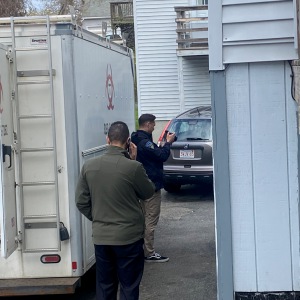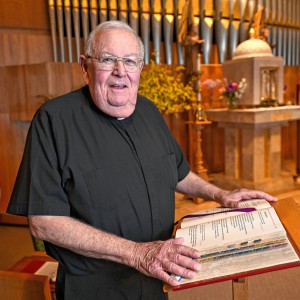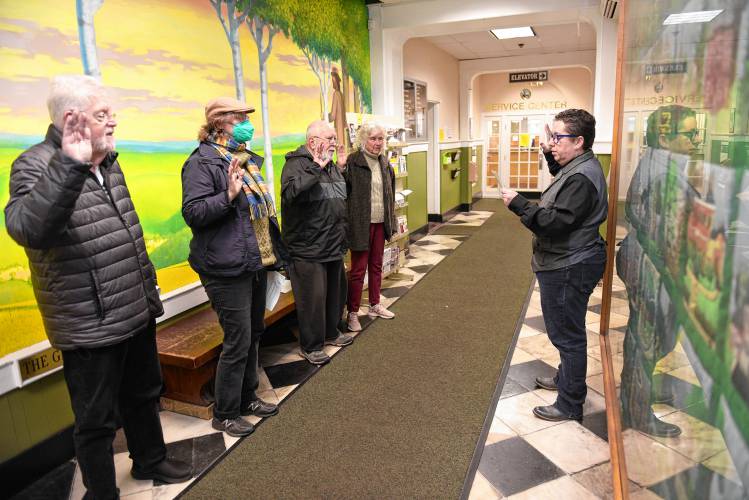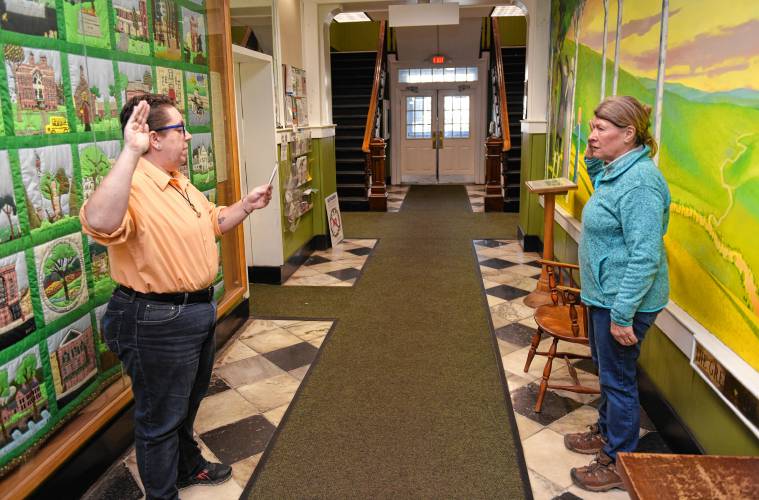Greenfield’s Agricultural Commission springs back to life
| Published: 03-09-2024 3:11 PM |
GREENFIELD — More than four years since its dissolution, the Agricultural Commission is back from the dead with three new members.
The newly appointed commissioners — Elizabeth Nett, David Johnson and Denise Leonard — were sworn in at City Hall on Thursday and Friday afternoons.
The commission serves as an advisory body to the Mayor’s Office, City Council, and other boards and committees. It is tasked with promoting and encouraging agriculture, educating the public on farming, and engaging in projects to promote farming practices, protect farmland and preserve farming culture.
According to Communications Director Matt Conway, the commission stopped meeting in 2019 and disbanded entirely during the COVID-19 pandemic. Conway said that since he began working for the city in 2019, the Mayor’s Office has received numerous requests from residents to reestablish the commission.
“Greenfield, Franklin County is a very rural area. You can drive down the street and see chicken coops and all sorts of lovely animals, so I think having a commission that meets the agriculture demands and has those important conversations is really essential,” Conway said.
Nett, a member of the Franklin County Beekeepers Association, said she realized how much the city needed to revive the commission roughly two years ago, when she said her neighbor was improperly raising bees on her property line.
“He installed two honeybee hives on my property line 25 feet away from my back door and neglected his hives,” Nett said. “I knew there was something wrong. I reached out to him and tried to hook him up with some mentorship for his beehives, but he wouldn’t talk to me. He wanted nothing to do with it, and guess what? There are no ordinances in this town for protection of backyard beekeeping.”
Nett said her neighbor “starved” the bees to death, and in doing so, posed a safety risk to one of her neighbors with a disability and another with a severe bee allergy. She plans to host regular educational workshops to inform the public on safe and humane practices in agriculture, beekeeping and raising animals.
Article continues after...
Yesterday's Most Read Articles
 Authorities ID victim in Greenfield slaying
Authorities ID victim in Greenfield slaying
 State records show Northfield EMS chief’s paramedic license suspended over failure to transport infant
State records show Northfield EMS chief’s paramedic license suspended over failure to transport infant
 Police report details grisly crime scene in Greenfield
Police report details grisly crime scene in Greenfield
 On The Ridge with Joe Judd: What time should you turkey hunt?
On The Ridge with Joe Judd: What time should you turkey hunt?
 ‘I have found great happiness’: The Rev. Timothy Campoli marks 50 years as Catholic priest
‘I have found great happiness’: The Rev. Timothy Campoli marks 50 years as Catholic priest
 Formed 25,000 years ago, Millers River a historic ‘jewel’
Formed 25,000 years ago, Millers River a historic ‘jewel’
“I want to support, stand beside and educate residents … be it marijuana, be it runoff from sheep, your neighbor’s ducks that are not being kept properly — which could be a real problem. It’s a win-win, because we’re going to educate people and be able to also help the animals at the same time,” Nett said.
Johnson, a Greenfield native, returned to the city in 2019 after spending more than four decades as a farm owner in Canaan, New Hampshire. He said he hopes to use his new role on the commission to approve fair livestock policies for smaller farms in the area, claiming that many of the state’s regulations are far too restrictive for lots of land between 1 and 5 acres.
Adding that he believes there are some safe farming regulations, such as potential ordinances regulating manure management and fencing, that would benefit Greenfield, Johnson said he will garner feedback from neighboring towns to draft effective and convenient ordinances.
“There are too many laws regarding agriculture being pushed through by people in Boston who have never been on a farm or dealt with animals. Sometimes they’re coming away with too many rules and regulations, and other times, they omit some that should be in place,” Johnson said. “If people have a reasonable amount of land, somewhere between 1 and 5 acres, technically, they’re very limited on what they can do without getting a waiver or permission from the Agricultural Commission. If someone has 2 or 3 acres and they want to keep two sheep or two goats, I don’t see why they can’t if they can meet the criteria.”
Like Johnson, Leonard is an experienced farmer who spent 50 years raising sheep, and currently runs Tanstaafl Farm on Adams Road. She joined the commission prior to its collapse.
Leonard said she hopes to use her role on the commission to protect the town’s Right to Farm ordinance, passed in 2002, and to preserve Greenfield’s place as an agricultural community.
“Farms can be a nuisance — they can smell, they can make noise, and people forget that that’s how they get their food. They move into a place in the country and they think they should not have to deal with that stuff, but the point is to just kind of educate people and let them know what the advantages are to having local produce,” Leonard said. “Greenfield was originally a farming community, and I think that its heritage should be recognized.”



 What are the protocols for emergency transport of infants?
What are the protocols for emergency transport of infants? Frontier Regional School students appeal to lower voting age
Frontier Regional School students appeal to lower voting age
